Attack on 9/11
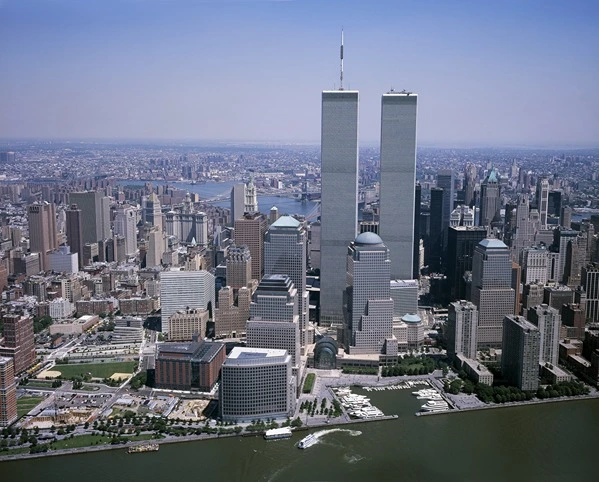
Twin Towers of the World Trade Center before the 9/11 attacks. Source: Wikimedia Commons
On September 11, 2001, 19 Al-Qaeda terrorists hijacked four passenger jets and attacked several targets in the United States. The hijackers crashed two of the planes into the towers of the World Trade Center, a third plane hit the Pentagon, and the fourth crashed in a Pennsylvania field, never reaching its intended target.
Background
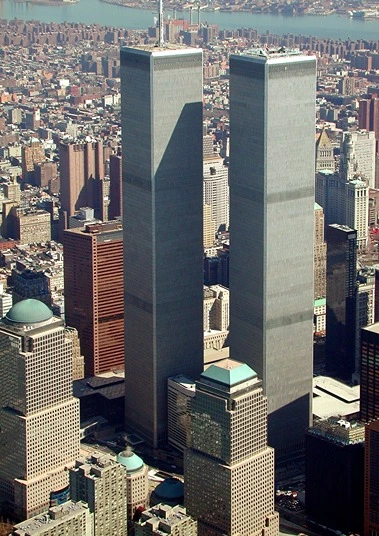
World Trade Center, New York Aerial View, March 2001 Source: Wikimedia Commons
World Trade Center
The World Trade Center in New York City was a large complex with hundreds of businesses from around the world housed in seven buildings. The first concept of the center was dreamt up at the 1939 World's Fair. Proposals began for the World Trade Center but were quickly forgotten due to budget concerns. Then in 1959, David Rockefeller, grandson of John D. Rockefeller, planned the $250 million World Trade Center. In 1973, construction was completed, and the World Trade Center opened. At the heart of the World Trade Center stood the two Twin Towers which towered over other buildings in the city's skyline. The design and safety of the twin towers were questioned even at their early stages. However, engineers promised that the towers would be safe during a plane crash.
Did you know?
The owner of the Empire State Building, Lawrence Wien, ran a piece in the New York Times in 1968 claiming that a passenger jet would fly into the towers.
Attack on the Twin Towers
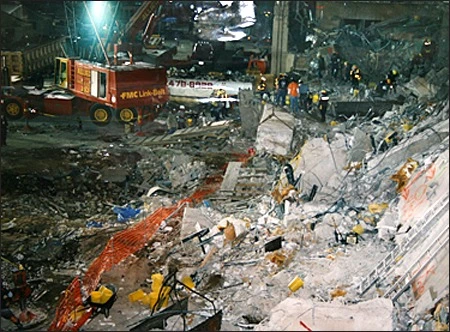
Investigators going through the rubble following the bombing of the World Trade Center in 1993 Source: Wikimedia Commons
The World Trade Center withstood its first attack in 1993 when a truck with dynamite exploded in the North Tower's parking garage. The attack killed six people and injured a thousand others. The bombing was deemed a terrorist attack when six Islamic extremists were found to be guilty of the attack. The North Tower still stood after the 1993 bombing had caused roughly $600 million in damage. However, the next terrorist attack would render devastating consequences on the World Trade Center.
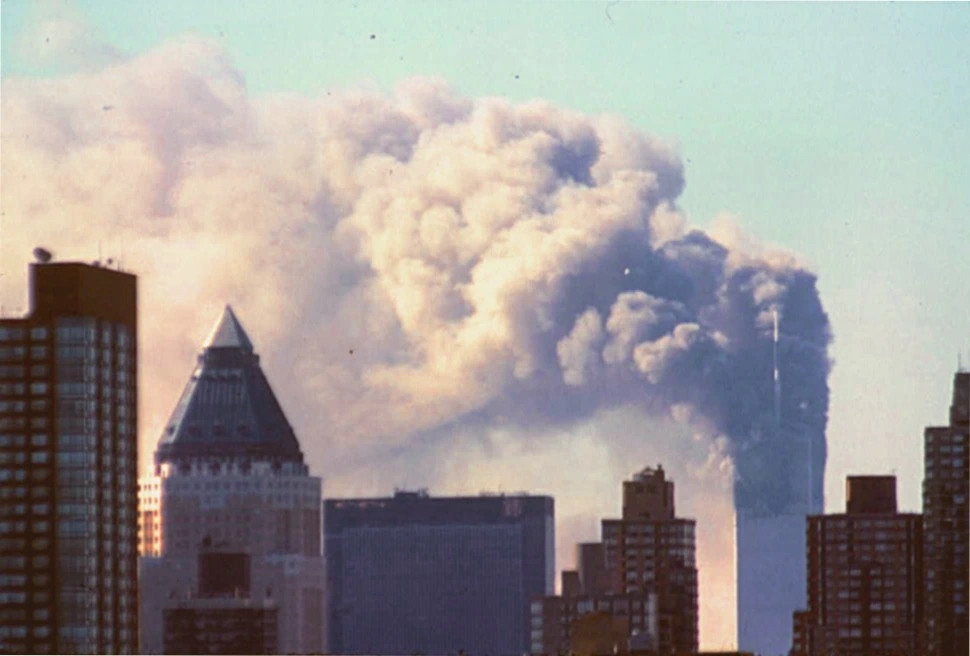
The North Tower was on fire after a plane crashed into it, by this time, the South Tower had already collapsed. Source: Wikimedia Commons
The second attack on the World Trade Center occurred on September 11, 2001, and would become the deadliest attack on American soil. At roughly 8:46 am, hijackers on Flight 11 crashed the passenger jet into the North Tower, destroying flights 94 through 98 and igniting thousands of gallons of fuel. Then, only moments later, hijacked Flight 175 crashed into the South Tower between floors 75 and 85. Due to the ignited jet fuel, fires raged in both towers weakening the buildings' structure. The South Tower collapsed at roughly 10 am, with the North Tower following only thirty minutes later.
But I saw what I can only describe as almost like a tornado hurtling at me. Just this cloud of dust that had to be over 100 feet in the air, and it was literally circling, and it was just bearing down. I mean, I'd never seen anything like that and everything move as fast as that, and I turned around and I yelled, "Run, Run, Cap, run!" 'Cause the captain was behind me. And he looked up-we all took off down the block, and I thought-I honestly thought in the midst of all that, "If this is going to come down and it's going to fall all at once as a building-if, I beat the cloud, I'll beat the building." And I said to myself as I turned and started to run, "I'm not gonna beat this cloud. It's just moving too fast." -Adrienne Wash, First Responder, Firefighter FDNY Ladder Company 20
In the quote above, Walsh remembers the North Tower falling and the devastating destruction that it caused.
Rescue Efforts and Clean up
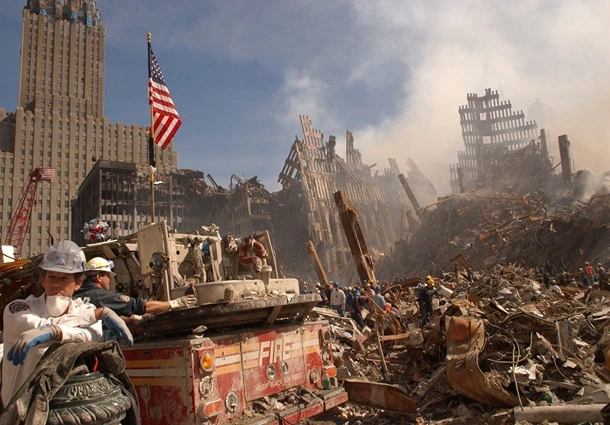
Urban search and rescue teams inspect the wreckage at the World Trade Center. Source: Wikimedia Commons
Rescue and recovery efforts were launched immediately following the attacks on the twin towers. Firefighters, EMS, and police immediately flocked to the scene, attempting to evacuate and rescue those still trapped in the towers. Following the towers' collapse, search and rescue efforts were ongoing to find any survivors. Only 20 people were pulled from the debris of the towers, including several police officers and firefighters. It would take nearly eight months for the site to be cleaned up. Eventually, plans for a memorial and another trade center would come to fruition several years later.
Did you know?
Due to communication malfunctions, many emergency personnel could not hear evacuation orders.
9/11 Memorial
The 9/11 memorial is constructed in the 16-acre area where the World Trade Center once stood. The structure memorializes those who died in the 9/11 attacks and those killed during the bombing in 1993.
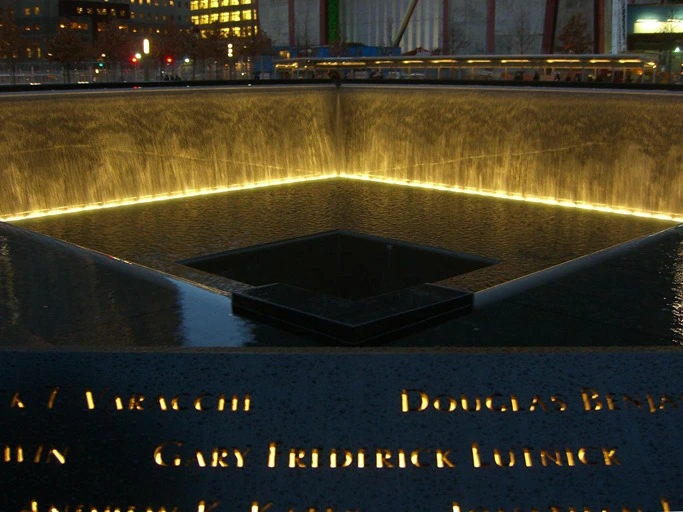
North Pool at the 9/11 Memorial and Museum Source: Wikimedia Commons
Construction of the 9/11 memorial began in April 2003 when the Lower Manhattan Development Corporation started an international design competition for the monument. Almost 5,201 submissions were entered from 63 countries.1 The competition's winner was Reflecting Absence, entered by architects Michael Arad and Peter Walker. The memorial contains the 2,983 names of those killed in the September 11 and 1993 terrorist attacks. It was officially completed ten years after the attacks on September 11, 2011.
The Survivor Tree
Spread throughout the 9/11 memorial are 400 white oak trees native to the surrounding area. However, the memorial contains one Callery pear tree representing resilience. During the recovery of Ground Zero, responders found a severely mangled pear tree. New York City Parks and Recreation decided to care for the tree giving it the name of the Survivor Tree. In 2010 the tree was placed at the center of the memorial as a reminder of the perseverance of the survivors and the families of the fallen.
Pentagon 9/11
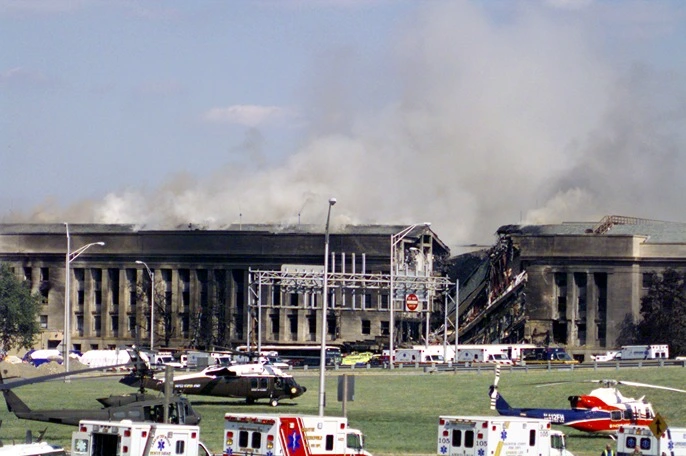
Damage from the terrorist attack on the Pentagon, 2001 Source: Wikimedia Commons
The Pentagon houses the headquarters of the U.S. Department of Defense and was included on the terrorists' target list on September 11. At exactly 9:45 am, American Airlines Flight 77 struck the Pentagon killing everyone on board and 127 inside the building. Jet fuel from the plane triggered massive fires that increased infrastructure damage. It would take almost a year to repair the damage caused by the attack.
9/11 Timeline
| Time: | Event: |
| 7:59 am | American Airlines Flight 11 took off from Logan International Airport and flew to California |
| 8:14 am | United Airlines Flight 175 took off from Boston and flew to California |
| 8:19 am | The Flight 11 crew alerted that the flight had been hijacked, and the FBI was notified |
| 8:20 am | American Airlines Flight 77 took off from Dulles International Airport, also flying to California |
| 8:40 am | The Northeast Air Defense Sector sent fighter jets after Flight 11, but they didn't even make it in the air before the passenger jet crashed into the North Tower |
| 8:41 am | United Airlines Flight 93 took off from New Jersey, headed to California |
| 8:46 am | Hijackers aboard Flight 11 crashed the jet into the North Tower, between floors 93 and 99 |
| 9:02 am | Evacuation of the South Tower began, 10,000-14,000 people had already started leaving |
| 9:03 am | Hijackers crashed Flight 175 into the South Tower, between floors 75 and 85 |
| 9:37 am | Hijackers on Flight 77 crashed the jet into the Pentagon |
| 9:42 am | The Federal Aviation Administration (FAA) banned all flights in the country. Almost 5,000 commercial and private planes were forced to land immediately. |
| 9:59 am | The South Tower collapsed |
| 10:07 am | Flight 93 crashed in an open field in Pennsylvania |
| 10:28 am | The North Tower collapsed |
Did you know?
It was the first time in America's history that the FAA had to ban all flights in the country.
America's War on Terror
Following the attacks on September 11th, President George W. Bush declared war on terror, stating:
The attack took place on American soil, but it was an attack on the heart and soul of the civilized world. And the world has come together to fight a new and different war, the first, and we hope the only one, of the 21st century. A war against all those who seek to export terror, and a war against those governments that support or shelter them." -President George W. Bush, October 11, 2001
The announcement of America's war on terror triggered new global relations that fixated on how important human rights, security, international law, and cooperation are. The war on terrorism became almost limitless, with military campaigns stretching from Afghanistan and Iraq to Yemen. In the early years of the war, successes were made with several suspects being arrested. Yet, many argue how successful America's campaign against terror was. Interrogation tactics and other methods that were considered necessary also came under fire. After involvement in a drawn-out war, American sentiment turned sour towards the "war on terror."
9/11 Deaths
| Deaths and Injuries of September 11 Attacks | |
| World Trade Center | 2,753 |
| Pentagon | 184 |
| Pennsylvania, Flight 93 | 40 |
| Total Deaths: | 2,977 |
| |
| Injured: | 6,000 |
Flight 93
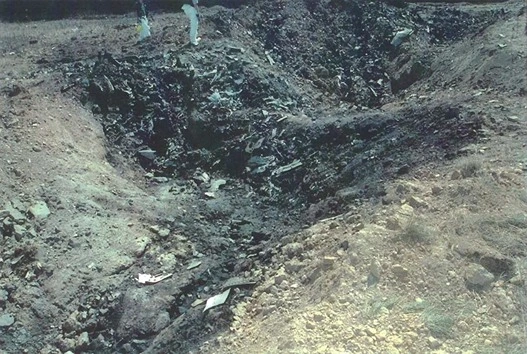
The crater at the Flight 93 crash site 2001 Source: Wikimedia Commons
After the twin towers were struck by hijacked aircraft, another passenger flight was routed to a different target. United Airlines flight 93 was hijacked by Al Qaeda while flying from New Jersey to California. It is the only hijacked flight that did not hit its intended target. The final target is still unknown but is believed to have been the Capitol building. After flight 93 was hijacked, passengers and the crew attempted to regain control of the plane. Unfortunately, during the struggle, the plane crashed in a field in Pennsylvania, killing everyone on board. Today, a memorial stands in the field honoring the brave passengers and crew of flight 93.
Turning Point 9/11
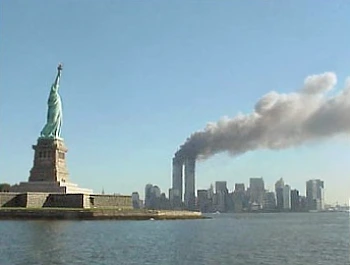
The Twin Towers of the World Trade Center burning before they collapsed on September 11, 2001. Source: Wikimedia Commons
Decades after the terrorist attacks, documentaries, and films strived to capture the devastation of September 11. One of the most well-known documentaries is Turning Point, created by Netflix and Brian Knappenberger. The series encompasses various aspects of 9/11, even covering Al Qaeda's history. The show also shows the mistakes made by the U.S., the following war on terror, and the incredible impact the attack had on America.
9/11 - Key Takeaways
- On September 11, 2001, Islamic terrorists hijacked four passenger jets, crashing two into the World Trade Center, one into the Pentagon, and the fourth into a field in Pennsylvania. The attack became the deadliest on American soil, killing almost 3,000 people.
- The twin towers were first attacked in 1993 when a truck filled with explosives exploded, injuring a thousand people and causing $600 million in damage.
- The Pentagon was struck by Flight 77, killing 127 people inside the building. The damage took almost a year to repair.
- Hijacked Flight 93 was taken back by the passengers and crew and crashed into a field in Pennsylvania.
- Following the World Trade Center attacks, a memorial was erected on September 11, 2011.
1. About the Memorial, 9/11 Memorial and Museum
















